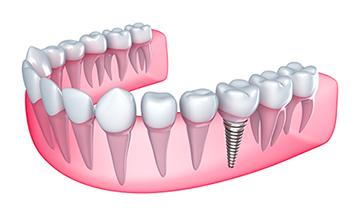 The effects of missing teeth on a person's health and self-image can be very difficult. Beyond embarrassment, gaps in a smile cause problems with chewing and speaking, drifting of remaining teeth and bone recession in the jaw. Tooth loss due to injury or extensive decay must be addressed. The question is, "How?"
The effects of missing teeth on a person's health and self-image can be very difficult. Beyond embarrassment, gaps in a smile cause problems with chewing and speaking, drifting of remaining teeth and bone recession in the jaw. Tooth loss due to injury or extensive decay must be addressed. The question is, "How?"
Frankly, traditional tooth replacement with partial dentures and fixed bridgework can compromise remaining teeth. In addition, these solutions are not permanent. Most bridgework lasts no more 7 to 10 years.
Enter the dental implant. Strong, attractive and virtually permanent, the dental implant is the gold standard in modern tooth replacement. Consisting of a titanium screw placed into the jaw bone and a beautiful porcelain crown, the dental implant looks, feels and functions just like a real tooth. The American Academy of Implant Dentistry states that not only is the dental implant procedure safe and highly successful, the implant is the only restoration which actually helps the jaw grow new bone, avoiding dramatic facial changes that accompany tooth loss.
Over the years, dentists have developed ways to replace 1, 2 or even a whole section or arch of teeth with implants. Some removable dentures can be supported with multiple mini-implants, giving the wearer a secure and natural looking set of teeth.
Are Dental Implants Right For You?
Your dentist can help you decide. Many individuals are excellent candidates for dental implants, including the elderly and adolescents over the age of 18 whose jaws have finished growing. However, dentists are cautious with patients who:
- are diabetic
- are smokers
- have insufficient jaw bone to accept an implant
- have advanced gum disease
Even these problems are not insurmountable, however, as gum disease can be treated and narrow or thin jaw bones can be augmented with donor tissue and other procedures.
Some patients worry their bodies may reject an implant. This is, in reality, extremely rare. Both the titanium screw and the porcelain crown are exceptionally biocompatible. The body accepts both, with bone adhering well to the metal implant through a process called osseointegration. An individual's biting and chewing forces help create a firm foundation for the replacement tooth.
What to Know About the Implant Procedure
If a patient gets anxious, he or she can rest assured that the implant procedure is comfortable. Some patients need local anesthesia, but many do not.
The dentist takes an impression of the patient's mouth so the dental lab can craft the porcelain part of the device. The dentist surgically places the implant right into the jaw bone. After a period of healing, the patient returns to the dentist for placement of the porcelain crown. Brushing and flossing at home, along with check-ups and cleanings as usual, keep the implant functioning well.
Your Tallahassee, Florida dentists
James F. Walton III DDS PA and David W. Cardman DMD are highly qualified to help you decide about implants. Quality dental services and compassionate care are what they do best. Call their office today for an appointment: 850-893-2136.